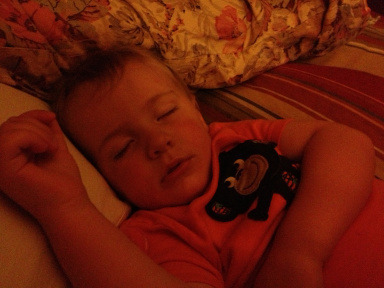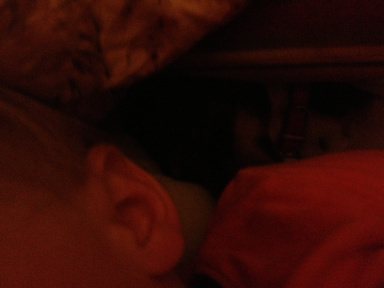Robert Jackson Bennett's Blog, page 9
March 25, 2013
SamCon 2013
I am included in a few spots in the schedule for SamCon 2013, an imaginary and horrible convention that is the brainchild of Sam Sykes.
My favorite session by far, however, is not mine:
Touch Patrick Rothfuss’ Beard
Seriously, just touch it. Go on, quit being a wuss. Look, tell him it’s for charity or something. Like, just get on up in there and give it a good stroke. I bet you—I fucking bet you—that something will fall out. Something like gold or some shit like that, maybe. Oh god, what if his beard parts and there’s another, five-inch version of Patrick Rothfuss in there and he just leans out and he…he just stares at you?
Patrick Rothfuss
4:30 PM, Gonzalez


March 21, 2013
Novels of Excess
The blog post I was thinking about writing yesterday got written – and can be found here, at Justin Landon’s Staffer’s Musings.
But there are certain works that somehow use the everything-and-the-kitchen-sink approach to writing to marvelous effect, huge, magnificent dirigibles of books that build and build until they’re towering cumulus clouds of words that can only dash themselves apart in the end, victims of their own tremendous gravity.


March 20, 2013
Big ol slew of reviews
A bunch of nice reviews came in in the last few days, and I’ve only had time to post about them now. (Little boy had a fever, and a serious case of the two’s – stayed up from about midnight to 4 in the morning a few nights ago requesting “choo choo.” Mossad should hire him as a negotiation contractor.)
From Jared at Pornokistch:
Mr. Bennett author I admire very, very much and American Elsewhere is his best book yet. Probably by a country mile. That’s not to knock the others, but I think American Elsewhere is Mr. Bennett’s most complete work to date – combining the tension of Mr. Shivers and the grandeur of The Troupe. To quote my grandma, “this book is a corker”.
Justin Landon at Staffer’s Musings:
Bennett evokes notes of H.P. Lovecraft, Neil Gaiman, and Stephen King, but does so in a voice and style that I’ve come to recognize as distinctly his. I believe Robert Jackson Bennett is one of the best living writers of speculative horror, and I wouldn’t argue dropping the last three words. Consider me his biggest fan.
Paul Simpson at Sci-Fi Bulletin:
Robert Jackson Bennett isn’t the sort of writer to sit on his laurels, and churn out books that resemble their predecessors simply because they’ve struck a chord with readers. From the period piece of The Troupe he’s moved forward to contemporary times to give an enthralling homage to B-movies that draws you in with various mysteries, and proceeds to present answers that make perfect sense within the world that he has set up. As with all his books, you need to concentrate when you’re reading it: clues to what is happening are seeded throughout, and you want to go back once you’ve finished to pick up on the elements that weren’t as obvious at first glance.
Bennett slyly grafts elements from David Lynch and Neil Gaiman, Shirley Jackson and H.P. Lovecraft, and nearly half of this brick of a novel carefully parcels out disruptions like the nightmare in Elm house. He is a master of the slow reveal, and scene after scene knocks the reader back on her heels, slips away from what we expect. There’s a real delight in how dark it gets behind the front doors in Bennett’s small town of Wink
John Clute, whom I admire, unfortunately found it too long and meandering, and not disciplined enough – which is a fair point. American Elsewhere is very much a novel of excess – but that’s more or less what I found that the book needed to be. I think there’s a style of book that fits into this category – glorious excess – and maybe in the future I’ll write a post about exactly what I think that is, and why such a style of book is worth reading.


March 19, 2013
Lucky I went into novels, then…
My grandmother was cleaning out her files, and found an old work of mine – a poem I wrote when I was probably 9.
Click here for some poetry.
I guess it’s nice to see my rosy and optimistic outlook on life has been in place from the start.


March 14, 2013
On strong female characters
I feel pretty weird about people saying my stuff, to any degree, contains a “strong female character.”
Part of this is because I don’t know what the hell a strong female character is. The first thing that springs to mind is this. This is satire, but it adheres close enough to the bone that it’s sometimes hard to tell.
The truth of it is, I don’t go into any story identifying any one character as strong, because this term is meaningless: for a character to be good in any way, they usually must be strong in some parts and weak in others. Generally speaking, a character is good if:
They have a defined (and preferably interesting, if not ironically contradictory) set of beliefs and goals in relation to their world
They act in adherence to these beliefs and goals
The world tests their adherence to these beliefs and goals (that’s the “weak” part, y’all)
The character re-evaluates and possibly changes their beliefs and goals after new experiences in their world
And that’s really all I think of when I go into it. If a character does not meet those requirements, then I hope to god they’re a background character – who does not have to be a good character any more than a fantastic prop in a movie has to have dialogue.
Am I successful all the time? Probably not. I hope I’m mostly successful, naturally, but I don’t expect to deliver 100% of the goods to 100% of the readership. (Because this is impossible.)
The point of this all is, I rarely go into my characters with an agenda beyond the story: a character serves the story, not vice-versa. Characters should not be fore-grounded, I think: they are, if anything, material that is molded and shaped by the machinations of the story.
So hearing that I’ve written a strong female character makes me feel weird. Because when people ask why I wrote one, the real answer is, “I don’t think I did.” Ideally, I wrote the character just like I’d write any other major character, and their gender wouldn’t have an effect on the flow of #’s 1-5 above more than any other feature.
This is a boring answer, but it’s a true one.


March 10, 2013
Why what you’re reading, right now, is bullshit
I have a tough time with the internet, on occasion – and I have a tough time with my generation, Gen Y, who grew up in the shadow of the internet and often seem to have difficulty imagining a world without it.
I especially have a tough time with the rising argument that, with the internet, all art can and should be free, and users of the art should become as patrons, tossing a coin into a bucket at the artist’s feet while on their way to work.
My real problem with this isn’t that this seems to defy common economics – a free thing, as we are so often told, has no value – nor is it that this could possibly further inequality. My real problem with this is that, as Chuck Wendig ably pointed out, in this sort of support structure, what is being marketed is not the Art, but the Artist.
In other words, we’re now in the age of “sharing,” and all artists are expected to provide a constant feed of their innermost personal lives, sharing every aspect of themselves, and the audience creates an intense personal connection not with the Art, but with the Artist, becoming a close, close friend that lives in the Artist’s pocket at all times. And because, y’know, you’re such close friends with the Artist, you feel obliged to buy their stuff.
But here’s the problem with that: it’s bullshit.
As we see time and time again, the connections we feel we make on the internet are often false: they’re often imagined, self-projected delusions that, when you try and enact them in real life, turn out to be wildly flimsy. It’s not unlike assuming the stripper at the strip club really feels something for you.
I, personally, can’t begin to describe the times that someone has found me in real life, assuming I would be the guy from the internet they thought I was, and both of us were, at best, weirdly disappointed.
In the worst occasions… Well. It can get pretty creepy, for me.
This is a cynical read of the audience, sure, but there’s plenty of burden on the Artist, too. I mean, think about what you’re reading right now – this is a blog. This is space on the internet that I can fill up with words, words that I choose.
Don’t ever forget that – what you’re seeing here is what I’m allowing you to see.
So, no, this is not the real me. For example, I can’t make crazy-ass off-color jokes on my blog, partially because I don’t want to, but also because someone, anyone, might get offended – and on the internet, being offended is like a precious drug. I definitely can’t discuss my political views because, frankly, that could piss off potential readers – readers I desperately, desperately need to keep. I don’t discuss all my doubts and fears and anxieties, both with my personal life and with the greater world, because A. that would be tedious to read, and also B. it could turn off lots of readers.
So, this is not me. This is my connection to you as A Writer of Published Works that You Could Buy – but it’s not me, Robert Bennett, who hasn’t showered today (long story) and really needs to weed the garden.
I can’t reiterate this enough: this is not me. Unless we have actually met and talked for more than 1 hour, in person, you probably do not know me.
Think about it this way: how much art – songs, stories, movies – are about people trying to find true love? How much art is about the unceasing chase for that real, genuine connection? How much art is about an established relationship where one of the parties doubts if that genuine connection is still there – Does my husband really even understand me anymore?
So, if it’s so hard to forge a genuine connection in real life – do you really think you’re going to find such a relationship purely on the fucking internet?!
But let’s say that both parties go ahead and encourage this, Artist and Audience proudly proclaiming, We’re all one big happy family. The issue is, these relationships are fraught with confusing expectations. Amanda Palmer, one of the biggest advocates for this new breed of support structure, encountered this problem herself, when she tried to launch Evelyn Evelyn, a sort of hoax/performance-art stunt that wound up upsetting many of her fans, since it seemed to exploit the disabled.
But if you look at the tone of the responses she got, many of them have deep undertones of betrayal: “I wouldn’t have expected this from you,” they seem to say. “I thought you were better than this. I thought I knew you!”
And here’s the problem – those fans didn’t actually know her. They thought they did, but they didn’t. So when she did something they didn’t expect, and didn’t want, that actually, personally hurt them.
This must have been tough to react to: because from my point of view, the Artist’s initial reaction would have been, “I don’t fucking know you people at all, so I don’t care what you think.” That’s the freedom of the artist. But, you can’t do that in this new support structure: these people are your friends. And you can’t share your genuine reactions of scorn with them, much as you can’t tell your spouse or best friend that you don’t give a shit about them or what they think.
This is the weirdo position this puts you in: you can’t tell any faction of your fandom that you don’t care what they think, because if you do, then all your other fans may wake up and realize they have no personal connection to you whatsoever. They’ll realize, in other words, that they don’t actually know you.
If you ain’t noticed, I do not endeavor to forge close personal relationships with you, dear readers. Rather, I try and have fun with this unreality a lot in my various internet efforts. Hell, look at my Twitter feed: yesterday I claimed to have once been imprisoned, and “inside” my name was Skinny Brisket, and I made a prized vintage of toilet wine called “butt slurry.” I’ve also claimed to be a shitty low-grade romance author, and in the next few days, you’ll see another video where I purport to be a disturbed, Truman Capote-esque, hillybilly author of teen girl mystery stories.
All of this is obviously untrue, but the funny part (if you find such things funny) is imagining that it might be true.
On the internet, anything could be true, and nothing could be.
I’m not really concerned about this new support structure, or Amanda Palmer, or any of that. What I’m concerned about is that this speaks of a characteristic apparently intrinsic to this new generation: the assumption that the internet is everywhere, and it is truth. In other words, the internet is noise, and we assume that, in this noise, all events and all things and all people can be found; it never strikes our minds, not once, that this noise might be just a chirp in a vast sea of silence, and that there might be more beneath those waves.


March 6, 2013
Wordspace Reading
I’ll be in Dallas on the night of the 13th, doing a reading for Wordspace:
So wait a minute. Mr. Bennett, at the age of 27, has won awards from organizations that honor horror, science fiction, and mystery. So just what does he write?
In a recent long profile in the Los Angeles Review of Books, Amy Gentry wondered that as well and had this to say, “… I have read all of his books. They are inventive, strangely passionate tales populated with loners on the wrong side of the American dream who are trying to understand their place in the universe. Also, there are monsters, aliens, detectives, and gods. On March 13, Bennett will be in Dallas reading from his new novel, American Elsewhere,at the Barnes and Noble in Lincoln Park on Northwest Hwy.
What is American Elsewhere about? Well, it’s like Amy Gentry says. Only I would add that it takes place in Wink, New Mexico, where the moon is pink, the lawns are perfect, and the smart people stay home after dark.
Details can be found here. I will sign anything you bring, even other signatures. (I will use very small writing.)


March 1, 2013
At least we can thank God birds don’t have blogs
I don’t have any problem admitting that genre is a tiring subject to me.
This is, of course, a thought that’s stirred up by the piece that went live on the Los Angeles Review of Books yesterday, about me and genre. Genre is a lot like a fairy house to me, in that from the outside it seems big and stable and impressive, this hard, concrete structure with careful architecture and many layers; but once you walk through the door, and look at it from the inside, there are hallways that go nowhere, doors that open on blank brick walls, stairs that just wind down and down and down and never reach the bottom floor.
Once you’re inside this classification system – once you are being classified – it loses all meaning. This is probably an effect of the considerable shift in position: as Orson Welles put it, “I’m the bird, you’re the ornithologist.” There is a huge difference in thought that separates the two powers at play here – the bird and the ornithologist, so to speak – so much so that they cannot understand one another.
In other words, the language, logic, and mindset that produces writing may have almost no similarity to the language, logic, and mindset that categorizes and analyzes it. They have different priorities and are doing different things. (Regular readers of this blog know that this is a fascination of mine: how writing and reading what is written are wildly divergent processes that are very much not in communication with one another and produce very different results.)
I say this because people often assume that writers are in a constant conversation with the genre systems they work within: it’s assumed we’re in dialogue with our critics, with our own genre institution, with the tropes and clichés and trends that emerge and submerge each month. I can’t speak for everyone, but personally, for me, nothing could be further from the truth. The process that produces a writer – the gallons of inspiration and errata that go pouring into a mind to create a perspective that is capable of producing writing – is very much a group activity: writers pull from a symphony of inspirations using many players (some they’re conscious of, many they aren’t), a big, bubbling mixed soup of experiences and ideas and personalities. But the actual writing is a lonely task, done in isolation.
Writing is, in a lot of ways, a conversation with one’s self: as Gaiman wisely put it, “I write to figure out what I think about things.”
Really good writing, I think, adheres to this line of thinking. Something that genuinely explores and dissects one person’s feelings and thoughts is a profoundly affecting thing to read. It produces a sense of connection and conversation that other mediums can’t aspire to (and whether this connection is real or imagined is a favorite debate of mine).
We think of fiction as a machine, with identifiable parts and a coherent system that works to produce specific effects, and we assume that we can look at these parts and categorize the systems as different things. But fiction, and perhaps all writing, is not like that: a work is not a machine, but a personality, a perspective. The constantly-changing opinions on genre bear a striking similarity to ongoing debates in psychology, sometimes, with opinions on, say, manic-depression slowly growing to be the dominant opinion; and, maybe, that opinion on who these people are, what they do, and how they feel, will change to become something else in five years.
However, just because a psychological opinion changes does not mean the people being studied change with it, much like how birds are happily oblivious to any sea change in ornithology. Birds will continue being birds, and though the treatments and diagnoses might change, people will still have their fair share of psychological troubles.
I have read the opinions studying what I am. I have read about axes and slipstreams and uptown fiction and all manner of -punks. My fiction might have lots of stuff in it (whatever that means). And it may be easy to read (a subject on which not everyone agrees). I don’t particularly care about either of these. I suppose what I care about is that, at the end of one of my books, the reader has the feeling that they have learned something new and very definite about the world. What they have learned can vary, depending on how much they wish to read into the text, but my private and perhaps vain hope is that they have learned something significant, something with weight to it, a piece of knowledge that they can pick up and put into themselves and carry with them long after they read the book; perhaps a feeling that, if only for a moment, they opened up the world, and looked at what was in its heart.
But that, much like the genre system, is all guesswork and shadowplay. In fiction, much like life, we are afforded few certainties, and part of being a writer – and part of being a person, probably – is learning to accept that, and just get on with it.


February 28, 2013
Giveaway, and profile in the Los Angeles Review of Books
There’s a fun Q&A with me and a giveaway of AMERICAN ELSEWHERE over here at Fantasy Literature.
I think the reason I pulled so many disparate things into the story is that I have such mixed, ambiguous feelings about the self-perception of America. The American Dream has been reimagined and rewritten so many times — probably most notably in the 80′s, then in the mid-90′s tech boom — that it’s a story with a lot of alterations to it. In our nebulous national subconscious, we tend to stick it right in the 50′s, but that image has all these changes and adjustments that came from other periods — both earlier, and later — and even other places.
But a big surprise would be this rather large and impressive profile on me and the nature of genre and literature that’s showed up in the Los Angeles Review of Books.
He sees both the style and subject matter as a departure from his previous books. “I guess you could say in the past I’ve been brewing a lot of whiskey, but this is a pale ale. You have to drink a lot of pale ale to get drunk, so there’s more of it.” (American Elsewhere is almost 700 pages long.) “Also, whisky is aged, it’s old, it’s been sitting around awhile. This is a book that has a certain newness to it, and not just because it’s contemporary. It’s kind of a book that’s obsessed with the idea of newness.” He pauses. “Like nostalgia.”
Nostalgia may seem an unlikely point of reference for describing newness, but inAmerican Elsewhere these concepts are thoroughly intertwined. Bennett sees the dawn of the Space Age as a unique moment of optimism for the future of mankind, an optimism that’s no longer available. “It’s quaint. I’m kind of jealous of the 1960s for having that kind of optimism. They had hope. In the past couple of years there’s been a downturn in science fiction, and the agreement is that the reason people aren’t so interested in science fiction anymore is that no one thinks that the future’s going to be very good.”
“Or existent,” I say.
“People worry about that too,” he says with a smile. But he is oddly unconcerned. Although his books reveal a deep pessimism about the world, the apocalypse in American Elsewhere is not chaotic. It’s an apocalypse of conformism and control. It’s about what happens when the world looks too normal.
I am amused to see that the profile suggests I am “aggressively normal.” I know that somewhere, my friends and family are pretty confused.


February 26, 2013
An interesting series of pictures
My almost-2 year old son gets along really well with my in-laws’ dachshund puppy, Scout. This is probably because they share the similar interests of throwing their bodies into things in a very uncoordinated manner and then seeming very happy about having done that.
Any whoo, my wife had to dogsit the other night, and my son passed out on her parents’ bed. This led to an interesting series of photos…
Yes. That would be Scout, who has burrowed up underneath all the pillows to sleep directly below my son’s head.









